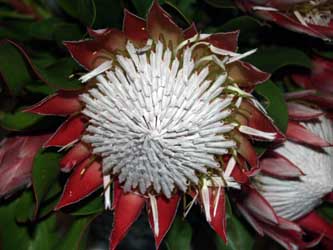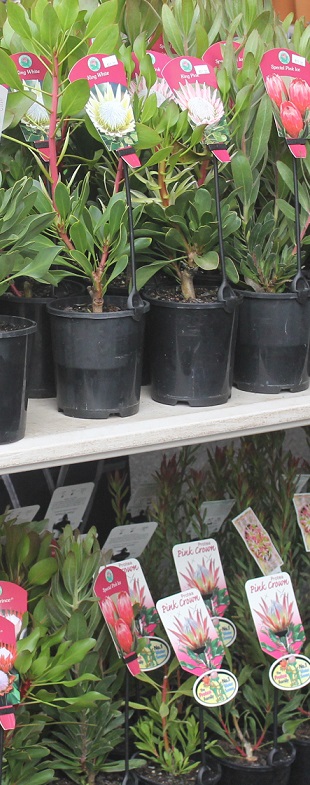
Specialise in Proteas
- Learn to Identify and grow a variety of different Proteas and related genera.
- Grow them as cut flowers or landscape plants.
- Propagate and nurture the plants for optimum vigour.
Many members of the Protea family (known as the Proteaceae) are relatively easy to keep growing, once established; often producing spectacular floral displays for decades if they are looked after. The flowers can be picked to decorate your own home, or you can sell them at roadside stalls, markets, etc. or directly to florists.
The term “Protea” is sometimes loosely used to refer to any plants in the Protea (or Protreaceae) family. However, the scientific name Protea is strictly confined to one genus. This is important to note as this course is primarily concerned with those plants classified scientifically into the genus Protea. Even nurserymen and cut flower growers the world over, may sometimes use the term Protea to refer to related plants within the Proteaceae family, such as Telopeas, Leucadendron and Leucospermum. However, strictly speaking these are not Proteas.
It is interesting to note that true Proteas do share some characteristics with related plants within the Proteaceae family. These include:
- Similar soil and water requirements.
- Susceptibility to the same problems.
- Other similar cultural needs.
- Sometimes a similar appearance, in foliage and flower.
Proteas are often known for their spectacular cut flowers. There are other members of the Proteaceae family, such as the Banksias, Hakeas, Dryandras and Grevilleas that also make excellent cut flowers. They are also known for their ability to handle tough dry situations where other plants would not.
This is a course for amateurs and professionals, including flower growers, plant collectors and breeders, nurserymen, botanists, landscapers, gardeners and horticulturists.
COURSE CONTENT
Duration: 100 hours of self-paced study.
This course is comprised of 8 lessons:
1. Introduction
- Review of the system of plant identification
- General characteristics of Proteas
- Information contacts (i.e., nurseries, seed, clubs, etc.)
- Protea botany
- One way of Classifying Proteas
2. Culture
- Planting
- Staking
- Mulching
- Watering
- Feeding (nutrition requirements, deficiencies, etc.)
- Pruning
- Protection from wind, salt air, etc.
- Drainage requirements
- Techniques for providing drainage, etc.
3. Propagation
- Methods of propagating this group of plants (cuttings and seed)
- Propagation of selected varieties, etc.
4. Most Commonly Grown Varieties of Proteas
- Protea cynaroides
- Protea mellifera
- Protea repens
5. Pests, Diseases and Problems
- Protea botany
- Pesta and diseases
- Drainage problems
6. Other Proteas to Grow
- Protea aristata
- P. caffra
- P. coronata
- P. cedromontana
- P. compacta
- P. exima
- P. grandiceps
- P. holosericea
- P. lacticolor
- P. laevis
- P. laurifolia
- P. longiflora
- P. longifolia
- P. lorifolia
- P. pulchra
- P. punctata
- P. rubropilosa
- P. recondita
- P. speciosa
- P. stokoei
7. Making the Best Use of Proteas
- Reasons for Growing Proteas
- Proteas for warm climates
- Hybrids
- More cultivars for landscaping
- Foliage affects
- Harvest and post harvest
- Dried Flowers
- Growing Proteas in Containers
8. Special Assignment - based on one of the following (your choice)
- How to grow Proteas for commercial flower production.
- The botanical characteristics and cultivation requirements for a selected Protea cultivar.
- A collection of different Protea cultivars on a budget equal to an average one-weeks wage for workers in your country. selection of the varieties to grow, how to establish them in containers, how to maintain peak health throughout the year.
- Month by month what to do to proteas to achieve and maintain peak health in your garden. You should indicate when to feed, how much and what. When to prune, and how. When and if to mulch. Pest control measures, etc.
Why Study with ACS?
Design your own learning pathway.
Study at your own pace, from anywhere, at any time.
Receive prompt, expert support from our team of committed and friendly tutors.
Your learning is our priority. We are flexible and adaptable to meet your educational needs!
WHAT NEXT?
Register to Study - Go to “It’s Easy to Enrol” box at the top of the page and you can enrol now.
or
Get Advice – Email us at info@acsedu.co.uk OR
Use our FREE COUNSELLING SERVICE to contact a tutor
CLICK TO CONTACT US